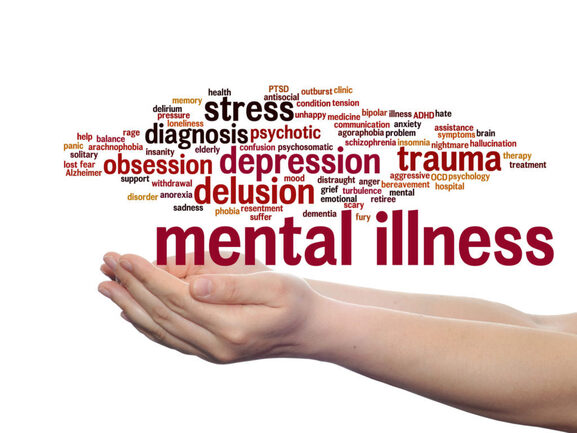5 Common Mental Disorders – Understanding and Awareness
Mental disorders are prevalent yet often misunderstood conditions that significantly impact an individual’s behavior and ability to function normally. These disorders are not confined to any specific gender or age group, making them a widespread issue.
Over 50% of the global population experiences some form of mental disorder at some point. Despite these high numbers, awareness and understanding remain limited. This article discusses 5 common mental disorders, offering insights into each.
Here’s a brief overview of 5 common mental disorders:
1- Depression Disorders
Depression is a common yet serious mood disorder. It affects how you feel, think, and handle daily activities. This condition can lead to various emotional and physical problems, diminishing a person’s ability to function at work and home.
Symptoms:
Persistent sadness, anxiety, or “empty” mood.
Feelings of hopelessness or pessimism.
Irritability, frustration, or restlessness.
Loss of interest in hobbies or activities.
Fatigue and decreased energy.
Difficulty concentrating, remembering, or making decisions.
Changes in appetite and weight.
Thoughts of death or suicide, or suicide attempts.
Causes:
Genetics: A family history of depression.
Brain structure and chemistry.
Environmental factors, like exposure to violence or poverty.
Personal history of other mental health disorders.
Chronic physical illnesses, like cancer, diabetes, or heart disease.
Treatment:
Medications, including antidepressants.
Psychotherapy, such as cognitive-behavioral therapy (CBT) or interpersonal therapy.
Lifestyle changes, including regular exercise and healthy eating.
Mind-body techniques, like meditation, yoga, or acupuncture.
2- Anxiety Disorders
Anxiety disorders involve more than temporary worry or fear. For a person with an anxiety disorder, the anxiety does not go away and can worsen over time, affecting daily activities, job performance, and relationships.
Types:
Generalized Anxiety Disorder: Chronic anxiety, exaggerated worry.
Panic Disorder: Recurrent panic attacks.
Phobias: Intense fear of specific objects or situations.
Symptoms:
Feeling nervous, restless, or tense.
A sense of impending danger or panic.
Rapid heart rate and breathing.
Sweating, trembling, and feeling weak or tired.
Trouble concentrating or thinking about anything other than the present worry.
Causes:
Genetics: Family history of anxiety disorders.
Brain chemistry: Imbalances in neurotransmitters.
Environmental stress: A traumatic experience.
Medical factors, like side effects of medication, symptoms of a different illness, or stress from a surgery.
Treatment:
Psychotherapy, particularly cognitive-behavioral therapy.
Medications, including antidepressants and anxiety-reducing drugs.
Lifestyle changes and stress management techniques.
Top 10 Famous Types of Passive Income – Experts View
3- Schizophrenia Disorder
Schizophrenia is a serious mental disorder in which people interpret reality abnormally. It can result in some combination of hallucinations, delusions, and extremely disordered thinking and behavior.
Symptoms:
Hallucinations: Seeing or hearing things that don’t exist.
Delusions: False beliefs not based on reality.
Disorganized thinking and speech.
Extremely disorganized or abnormal motor behavior.
Negative symptoms: Reduced ability to function normally.
Causes:
Genetics: Risk increases if a family member has schizophrenia.
Brain chemistry and structure: Imbalances in neurotransmitters.
Prenatal factors: Exposure to viruses or malnutrition in the womb.
Psychosocial factors: Stressful or traumatic life events.
Treatment:
Antipsychotic medications.
Psychosocial treatments, especially early in the disease.
Coordinated specialty care (CSC), involving a team-based approach.
Supportive therapy, such as rehabilitation, job training, and social support programs.
4- Obsessive-Compulsive Disorder (OCD)
OCD features a pattern of unwanted thoughts and fears (obsessions) that lead you to do repetitive behaviors (compulsions). These obsessions and compulsions interfere with daily activities and cause significant distress.
Symptoms:
Fear of germs or contamination.
Unwanted forbidden or taboo thoughts.
Aggressive thoughts towards others or self.
Having things symmetrical or in a perfect order.
Compulsive counting, checking, cleaning, or washing.
Causes:
Genetics: Family history of OCD.
Brain structure and functioning.
Environmental factors: Childhood trauma or stressful events.
Treatment:
Psychotherapy: Cognitive-behavioral therapy.
Medications: Antidepressants are often used.
Neuromodulation: In severe cases, deep brain stimulation (DBS) or transcranial magnetic stimulation (TMS).
5- Dementia Disorder
Dementia describes a group of symptoms affecting memory, thinking, and social abilities severely enough to interfere with daily functioning. It’s not a specific disease, but several diseases can cause dementia.
Symptoms:
Memory loss.
Difficulty communicating or finding words.
Difficulty with visual and spatial abilities, like getting lost while driving.
Difficulty reasoning or problem-solving.
Difficulty handling complex tasks.
Difficulty with planning and organizing.
Difficulty with coordination and motor functions.
Confusion and disorientation.
Causes:
Alzheimer’s disease: The most common cause of dementia.
Vascular dementia: Caused by microscopic bleeding and blood vessel blockage in the brain.
Lewy body dementia: Associated with abnormal deposits of a protein called alpha-synuclein in the brain.
Frontotemporal dementia: Includes dementias like behavioral variant FTD (bvFTD), primary progressive aphasia, Pick’s disease, corticobasal degeneration, and progressive supranuclear palsy.
Treatment:
There’s no cure for dementia, but there are ways to manage symptoms.
Medications: Cholinesterase inhibitors and memantine.
Therapeutic activities: Memory therapy and lifestyle changes.
Supportive care: Assisting with daily activities and creating a safe environment.
Conclusion
Mental health disorders are more than just medical conditions; they are significant challenges that impact individuals, families, and communities. Recognizing the commonality and seriousness of these disorders is the first step towards breaking the stigma surrounding mental health. Understanding these 5 common mental disorders; depression, anxiety, schizophrenia, OCD, and dementia are not weaknesses but serious health conditions is vital for societal acceptance and support.
Proper diagnosis and treatment are essential for managing these disorders. With advancements in medicine and psychology, there are now more effective treatments and therapies available than ever before. However, beyond clinical treatment, there’s a need for compassionate understanding and societal support. Education and awareness play a key role in helping people recognize symptoms early and seek timely help.
Mental health should be a priority in our lives, and as a society, we must cultivate an environment where those suffering feel safe to seek help without judgment. Remember, mental health is just as important as physical health, and taking care of our mental well-being is crucial for a balanced and fulfilling life. By working together, we can create a world where mental health disorders are understood, treated with respect, and integrated into our collective efforts towards health and well-being.
Finally, we must all take part in fostering a culture of openness and support, encouraging conversations about mental health, and providing a helping hand to those in need. By doing so, we can hope to see a future where mental health disorders are not just managed, but also significantly reduced, and where individuals affected by them can lead fulfilling lives.
More from our blog
Top 10 Business Books to read in 2024 for anyone aiming to excel in business
What if Anxiety Disorder becomes chronic?
If this disorder isn’t diagnosed and treated on time and get severe or chronic then it may lead to some negative upshot. Such, as productivity loss, lessening the interest in society, urging to suicidal thoughts or attempts.
What If Schizophrenia is not treated?
Untreated Schizophrenia: Long-term neglect can lead to suicide risks and links to OCD.
How to know the OCD Severity Level?
Severe OCD is characterized by intense and frequent compulsive behaviors or rituals, which are performed in an attempt to alleviate anxiety. This can manifest in various forms such as persistent handwashing, constantly checking and rechecking things, compulsive counting, repetitively uttering words or phrases, or methodically arranging objects in a particular way. These behaviors often go beyond everyday routines and significantly interfere with daily life.




One Comment